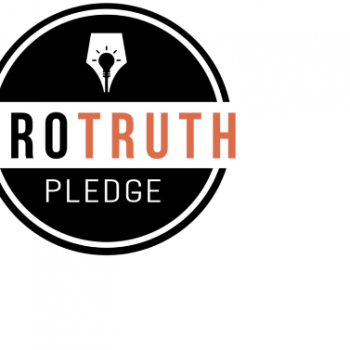
In 2013, the Secular Coalition for America published an Open Letter signed by a host of major leaders of national secular leaders about “improving the tone and substance of online discussions.” The letter read, in part:
- We refuse to allow the deplorable conduct of a few to debase the reasonable, appropriate, and respectful conduct of the overwhelming majority of our community… Of course we will disagree with each other on some issues, but we can do a better job of expressing our disagreements. We can resolve to avoid mischaracterizing the positions of others, relying on rumors as the basis for our opinions, and using inappropriate tactics such as guilt by association.
A worthy goal, indeed. However, the need for such a letter points to a systematic problem. The letter noted “the fact that so much of our community is online brings with it certain challenges. Communicating primarily online can make it difficult to recognize each other’s humanity.”
Despite the letter, there is still a great deal of slander going on – whether guilt by association, negative rumors, mischaracterization, lying by omission, and so on. Such bad-mouthing is hard to address effectively, because it doesn’t go on in open spaces. Usually, it happens in private interactions, for example on someone’s Facebook wall, or in comments on a blog post, or private emails; it also happens on anonymous social media forums such as Reddit and elsewhere. It also happens in-person of course, but behind people’s backs, such as late evenings in bars at secular conference hotels or during chit-chat at local secular get-togethers.
A particularly insidious aspect of rumors comes from their decentralized, anonymous nature. It’s usually hard to say who specifically started a rumor, or why they did so. Sometimes, people start rumors out of simple maliciousness; other times, they have legitimate concerns but are reluctant to state their concerns to someone’s face and so talk behind their backs. In some cases, such rumors have led to positive outcomes, but in the large majority of cases, they have not. Besides, even in cases where rumors do lead to positive consequences, these results could have been achieved by other means, as opposed to rumors. Because whatever happens, rumors as a phenomenon increasing resentment and infighting, contributing to the harmful schisms and feuds within the secular movement.

So how does one deal with such slander? Let me share what strategies I deploy when it happens to me.
For example, a new volunteer for the Pro-Truth Pledge, a project devoted to fighting lies and promoting truth and rational thinking in politics and other life areas, came to me recently to share that he heard concerning rumors about me. He spoke to a number of acquaintances in the secular movement who accused me of creating fake “sock puppet” accounts on Facebook to argue for my points and otherwise promote my work. He wanted to know if I created such accounts, as he would not want to be associated with a person who used such tactics. By coincidence, someone who has been involved in the secular movement for a while also recently brought me information about such rumors the day beforehand.
My first feelings? Confusion and anger. My reputation – perhaps my most valuable commodity – was being maligned. This slander was especially ironic in that I have spent a great deal of personal, unpaid volunteer time creating content advancing truth and rational thinking. To address my emotions, I took time to calm down and composed myself.
Then, I asked both the people who brought me this information to join me in thinking reasonably. I am a public figure who publishes regularly in mainstream venues such as Time, Scientific American, Psychology Today, The Conversation, Salon, Truthout, The Huffington Post and reason-oriented venues such as The Humanist, Skeptical Inquirer, Free Inquiry, American Atheist Magazine, Secular World, and Patheos. He has appeared as a guest on network TV, including affiliates of Fox and ABC, and radio stations such as NPR, WBAI (New York City), KGO (San Francisco), 700WLW (Cincinnati), KLRD (Dallas), AM980 (Canada), as well as reason-oriented podcasts, such as Ra-Men Podcast, The Scathing Atheist, Serious Inquiries Only, Sensibly Speaking, and The Humanist Hour. My service as volunteer President of Intentional Insights, the nonprofit running the Pro-Truth Pledge and other projects devoted to spreading rational thinking, involves coordinating hundreds of volunteers to promote its mission – in addition to fundraising to support its work. I also work a full-time job as a professor.
Where would I find the time to create sock puppets, and why would I need to? My time is much more effectively spent scheduling and doing podcasts and writing articles, which I do – extensively. Besides, when I publish an article, I take the time to share it to some groups myself from my Facebook page, to get things going, and the more important the article is, the more time I take to share it.
As someone who is an activist for truth, it is repugnant to me to even imagine creating such sock puppets. Closing my eyes and trying to visualize the process of logging out of my actual account, and setting up a fake account to promote my work, causes me to breathe quickly, my hands to shake, my nose to scrunch up in a visceral disgust response. Yuck!

I do have a number of supporters who like my writings and believe it is valuable for the world to promote them. Indeed, when I share my posts on Facebook, I often have a call to action asking people to share them. Naturally, my posts then tend to be shared, and these supporters tend to do most of this sharing. Some of them even created social media accounts explicitly for this purpose. Many of the people who tend to share my posts most tend to be from developing countries, as I make a particular effort to reach out to secular people there, something unusual for secular activists in the US. They tend to be more likely to become “superfans” and share my content more broadly, as well as become volunteers for the nonprofit I run. Some of these people have become my good friends, even though I’ve never seen them in person: I know about their lives, troubles, worries, and concerns, and support them in their struggles. I trust one to such an extent that I give him my password for my Facebook to spend time sharing articles so that I can focus on writing and interviews and organizing behind the scenes. Some of them the nonprofit I run hires to do highly-discounted part-time contract work in areas where we have no volunteers who have that capacity, such as editing videos or doing social media management. It’s disheartening to observe the prejudice of some people in the secular community when they see these people sharing posts and assume that these are “sock puppets” just because they came from developing countries. The prejudice toward these people on the part of some secular activists is repugnant to me.
Now, am I perfect? No, of course not! I made my own set of mistakes in the past, and I would be very surprised if I don’t make some in the future. Regarding marketing, the nonprofit I run has made some mistakes in its promotion efforts. The most major one was our social media manager falling for the trap that the Pentagon and other major organizations have also fallen for, described in this video, which resulted in some people clicking “like” on the nonprofit Facebook page who did not really care for the mission of the nonprofit. While I am not the person who made that mistake, I chose the person who does our social media management, and the buck stops with me: I take ownership for that mistake. Another mistake that I personally made was aggravating some Facebook group admins when I posted articles in their groups too often, or when the volunteer running my Facebook profile did so. With Facebook being a relatively new medium, and me being eager to promote rational thinking and wise decision-making, I sometimes went too far during my early days of transitioning from being just an academic to a secular activist engaged in promoting important ideas. While most of these mistakes came from the volunteer, I own those mistakes for the same reason as above: the buck stops with me. A third mistake was lack of clarity when I talked about myself being an Amazon best-selling author: some people were unaware that becoming an Amazon best-seller is quite a bit easier than becoming a New York Times best-seller, and were disappointed when they learned that the sales of my books numbered in the thousands instead of hundreds of thousands. I regret my mistakes and have learned from them: our social media manager is very careful about promoting posts, I do not describe myself as a best-selling author anymore, and our Facebook group engagement is much more soft now. More broadly, our promotion efforts are much more mild than they used to be in the past. I also made mistakes in areas outside of marketing, mainly due to my optimistic and trusting personality. For example, I tend to be too trusting that volunteers who said they would do something actually follow through, and have been disappointed many times in the past. I also failed to invest the money necessary to protect our website from denial of service attacks, and we suffered one as our work in the political sphere was getting notice and popularity. I had to scale back my naturally trusting and optimistic personality, and express more skepticism and distrust. Life taught me those unpleasant lessons.
With the mea culpa over, let me go back to what happened to the sock puppet rumors. The two people who brought me this information understood where I am coming from, and recognized that yes, thinking reasonably, it would be silly for me to waste my time on creating sock puppets to share or debate on behalf of my article points. Indeed, as my Patheos readers know, I’m quite fine engaging in debates in comments on my articles when I perceive those debates as productive.
Still, I was pretty shocked that people who would call themselves reason-oriented indulge in these types of conspiracy theories. We have enough in-fighting in the secular movement that we don’t need more folks to spread these rumors, which they could easily address by taking a couple of minutes to think about whether I would want to take my time to do this sort of manipulation.
Well, knowing the behavioral science, I know why. Juicy rumors are often more appealing than rational thinking even for some reason-oriented people. Passing them on makes one feel powerful and “in-the-know.” Often, they do not like the target and are ready to believe and pass on whatever negative things they hear, a phenomenon known as the “horns effect” in psychology.
Fortunately, research shows that negative consequences of deceptive behavior, combined with transparency, help decrease such behavior. So I decided to confront the rumor-mongers. My friends shared their names, and I was surprised to learn they had some prominence in the secular movement. I sent them a message, telling them I was highly concerned with claims they made, and asked them to provide evidence.
Two of them quickly backed away from their claims. I let it go and accepted their retraction of the claims, along with a commitment on their part to avoid spreading negative rumors about me or others.
Another one refused to back away, despite my explanation about my busyness and how I can use my time much more effectively to promote my ideas in other ways than sock puppets. In any group, even among folks who pride themselves on reason, we will find unreasonable people. Still, two out of three isn’t a bad outcome.
Some secular activists to whom I showed a draft copy of this blog post pointed out that sometimes, rumors are not dealt with so easily, because they are not obviously ludicrous once someone takes a couple of minutes to think about them. Indeed, there have been plenty of scandals in the secular movement – around sexual improprieties and outright harassment, embezzlement, and other problems – that are not as easy to address. In those cases, we have to appeal to probabilistic thinking, meaning evaluating the probabilities involved, but also given the call by secular leaders, orient toward avoiding forming opinions based on rumors and instead get the actual information by doing some research. Doing research is not possible in all cases, of course, but in all cases we can have a baseline skepticism of rumors that do not point to solid evidence to support their claims.
So let’s go back to what I did. I did not react emotionally, despite feeling confusion and anger. Neither did I make a public stink about these rumors. Instead, I calmed myself down and reacted intentionally, by pointing out the ludicrous nature of these claims.
Rather than letting it go at that stage, after convincing my friends, I also decided to impose penalties on and bring transparency to the rumor-mongers by confronting them. I communicated my concerns clearly to them, and got a quite positive outcome by getting two out of three to commit to avoiding spreading such rumors. Ironically, about a month after I published this blog, someone from the secular community who claimed that he “despise[es] infighting in the secular community,” and “do[es] everything he can to avoid it” chose to publish a blog with these rumors. Oh well – such is life. You can’t always succeed with such people. Best to ignore them after making a clear statement of your perspective and move onward rather than get stuck in a flame war.
Many people may find difficulty with communicating concerns to rumor-mongers, as doing so is socially awkward. We don’t want to make enemies or trigger conflicts by confronting people. Yet let’s face it – by spreading rumors, these people already are your enemies. They are damaging your reputation, which is an incredibly valuable commodity. They are hardly likely to do something worse if you confront them. Many of these rumor-mongers are verbal bullies, and back away when confronted. Others are deliberately spreading rumors as a fun, enjoyable activity, and you need to make it less fun for them. Still others are misguided folks who think they are doing something good for the world: help teach them that they are not.
By confronting these slanderers, you make a better world not only for yourself, but for the secular movement as a whole. Your actions will both protect you and also serve to, as the secular leadership put it, “refuse to allow the deplorable conduct of a few to debase the reasonable, appropriate, and respectful conduct of the overwhelming majority of our community.”
What other strategies do you think might be useful to deal with slander in our community?
P.S. Want to fight rumors and lies? Take the Pro-Truth Pledge, encourage your friends to do so, and call on your elected representatives to take it!
_______________________________________________________________
Connect with Dr. Gleb Tsipursky on Twitter, on Facebook, and on LinkedIn, and follow his RSS feed and newsletter.













